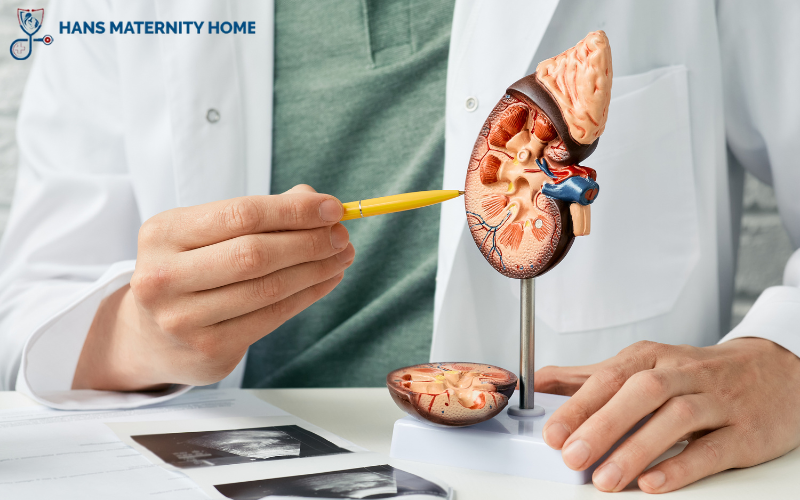Introduction to Kidney Stones
Are you feeling a sharp pain in your side that just won't go away? It could be kidney stones causing all the trouble! But fret not, because Dr. Prabhjot Singh Hans, the best urologist in Ludhiana, is here to guide you through everything you need to know about these pesky little crystals wreaking havoc in your kidneys. So sit back, relax, and let's dive into the world of kidney stones together!
Causes and Risk Factors
Kidney stones can be caused by various factors, including dehydration, which leads to concentrated urine that facilitates stone formation. Diets high in salt, sugar, and protein can also contribute to the development of kidney stones. Moreover, certain medical conditions such as obesity and digestive diseases can increase the risk of stone formation. Seeking advice from specialists at Hans Maternity Hospital can provide further guidance on managing and preventing kidney stones.
Genetics play a significant role in determining an individual's susceptibility to kidney stones. If someone in your family has had kidney stones before, you might be more prone to developing them as well. Additionally, age and gender are key risk factors for kidney stone formation. Men are more likely than women to experience kidney stones, and people aged 30-60 are at higher risk.
Other contributing factors include a sedentary lifestyle and certain medications that may promote the growth of kidney stones. Understanding these causes and risks is essential in taking preventive measures against this painful condition.
Symptoms and Diagnosis
Are you experiencing sharp pain in your back or side? Perhaps you've noticed blood in your urine, or a persistent need to urinate more frequently. These could be signs of kidney stones silently forming inside your body.
Diagnosing kidney stones usually involves a combination of medical history review, physical examination, and diagnostic tests such as CT scans or ultrasounds. Your healthcare provider may also request a urine sample to analyze for any abnormalities that could indicate the presence of kidney stones.
It's crucial not to ignore these symptoms as they can worsen over time if left untreated. Seeking medical attention early on can help prevent complications and provide timely relief from the discomfort caused by kidney stones. Stay informed about the warning signs and don't hesitate to consult with a urologist for proper diagnosis and treatment options.
Treatment Options
When it comes to treating kidney stones, the approach taken depends on various factors such as the size of the stone, its location in the urinary tract, and the symptoms experienced by the patient. In many cases, small stones can pass through the urine without any medical intervention. Drinking plenty of water and pain management medication may be all that's needed.
For larger stones or those causing severe symptoms, more aggressive treatments may be necessary. Extracorporeal shock wave lithotripsy (ESWL) is a common procedure where shock waves are used to break up the stone into smaller pieces that can then pass more easily through urine. Another option is ureteroscopy, which involves using a scope to locate and remove or break up the stone.
In some cases, surgery may be required to remove large stones that cannot pass on their own. This could involve minimally invasive procedures like percutaneous nephrolithotomy (PCNL) or traditional open surgery for complex cases. Consulting with a urologist will help determine the most suitable treatment plan based on individual circumstances.
Prevention Techniques
Kidney stones can be incredibly painful and disruptive to daily life. Prevention techniques play a crucial role in reducing the risk of developing these troublesome stones. One of the most important steps you can take is staying hydrated by drinking plenty of water throughout the day. This helps to dilute substances in the urine that could lead to stone formation.
Maintaining a balanced diet that is low in sodium and oxalate-rich foods can also help prevent kidney stones from forming. Foods like spinach, chocolate, nuts, and certain fruits should be consumed in moderation. Additionally, limiting your intake of sugary beverages and alcohol can contribute to overall kidney health.
Regular physical activity is key to preventing kidney stones as well. Exercise not only helps maintain a healthy weight but also promotes good circulation, which can aid in preventing stone formation. It's essential to follow up with your healthcare provider for routine check-ups and screenings to catch any potential issues early on.
Conclusion: Living a Healthy Life with Knowledge about Kidney Stones
Kidney stones can be a painful and bothersome condition, but with the right knowledge and proactive steps, you can manage and even prevent them. By understanding the causes, symptoms, diagnosis, treatment options, and prevention techniques of kidney stones as discussed by Dr. Prabhjot Singh Hans in this comprehensive guide, you are equipped to make informed decisions about your health.
Remember that staying hydrated is crucial in preventing kidney stones. Adding lemon juice to your water can also help reduce the risk of stone formation. Eating a balanced diet low in sodium and high in fruits and vegetables can further aid in prevention.
Regular check-ups with a trusted urologist such as Dr. Prabhjot Singh Hans in Ludhiana will ensure early detection and prompt treatment if needed. Don't ignore any symptoms or discomfort; seek medical attention promptly.
By living a healthy life informed about kidney stones, you are taking control of your well-being. Stay proactive, stay informed, and prioritize your health above all else. If you require expert care for kidney stones or any other urological issues, consult the best urologist doctor in Ludhiana – Dr. Prabhjot Singh Hans – for personalized care tailored to your needs.





Comments